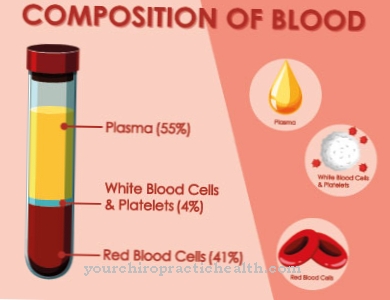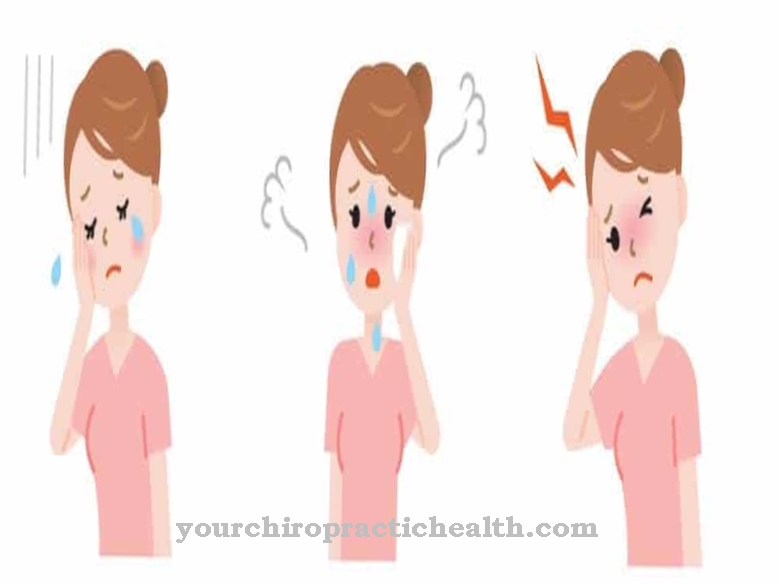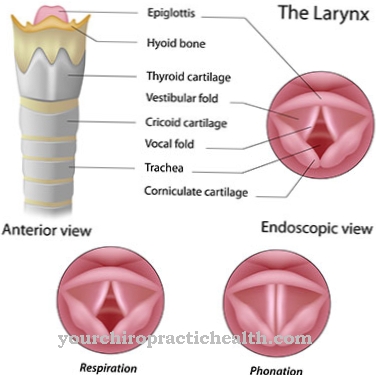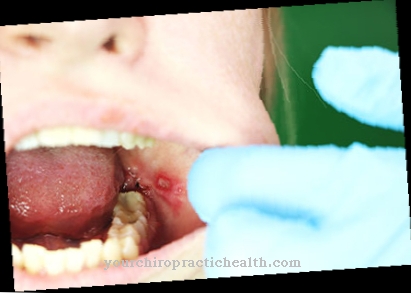The ear is one of our most important sense organs. Most people only realize how important it is when they hear worse. Due to our noisy environment, hearing loss is increasing, even younger people are affected, sometimes also young people. A cause can be a Window tear be in the inner ear.
What is a window tear?

© 7activestudio - stock.adobe.com
There are two wafer-thin membranes in the middle and inner ear that cover the round and oval window. These two membranes separate the middle ear, which is filled with air, from the fluid-filled labyrinth, consisting of the cochlea and the equilibrium apparatus.
If a membrane ruptures in one of these two windows, this is called a window tear. Fluid leaks into the middle ear area and leads to various complaints such as hearing loss, deafness and dizziness.
causes
A window rupture can have various causes. When flying or diving, a sudden change in pressure can cause a window rupture. Even with skull injuries z. B. by an accident, it can lead to injuries to the inner ear and a window rupture.
A window rupture is particularly common when there is an explosion or an extremely loud bang. In addition, leisure noise is a risk that should not be underestimated. A window rupture is a serious injury that must be treated immediately if one wants to avoid more serious damage.
You can find your medication here
➔ Medicines for ear complaints and hearing problemsSymptoms, ailments & signs
A window rupture always has a very negative effect on the hearing of those affected. The patients suffer primarily from hearing loss and thus from a very pronounced hearing loss. Hearing loss can vary widely and usually depends on the exact cause of the window rupture.
In some cases, however, those affected are dependent on hearing aids in order to still be able to participate in conversations. This disease also leads to a very strong feeling of pressure in the ears, which can have a negative effect on the everyday life of the person affected. This often leads to earache, which can continue to spread to the teeth or head.
The window rupture is also not infrequently associated with dizziness, and in severe cases those affected can also lose consciousness and fall. This can also lead to various injuries. Some people also suffer from noises in their ears or even tinnitus.
This can also occur at night and thus lead to sleep problems and irritation in the person concerned. In young people in particular, sudden hearing problems can lead to mental disorders or even depression.
Diagnosis & course
If a window rupture is suspected e.g. B. After a bang, accident, as a result of excessive pressure, etc., an ear, nose and throat specialist should be consulted immediately to see whether there is a window rupture or another cause. There are several ways to diagnose a window tear:
Examination with the ear mirror
The doctor uses an ear mirror to examine the external ear canal and the eardrum. If there is an injury to the eardrum, he can see it through the ear mirror. A window tear is not that easy to recognize. But the doctor can tell if an ear infection is affecting hearing.
Hearing test (tone audiometry)
With a hearing test, the doctor can tell whether it is a sound conduction or sensorineural disorder. This is how he can determine whether the middle ear is damaged.
endoscopic examination of the middle ear (tympanoscopy)
Complications
A window rupture leads to severe restrictions and complications in the ear. The patient suffers from hearing loss and, in the worst case, can suffer complete hearing loss. In addition to hearing impairments, dizziness and vomiting occur. Most patients also suffer from ringing in the ears or tinnitus when a window ruptures.
The constant noises in the ear result in a severe limitation in life. Those affected suffer from insomnia or difficulty concentrating. As a result of the hearing loss, normal everyday life is no longer possible, and patients are often dependent on hearing aids. The window rupture can be treated relatively well with a surgical procedure.
However, the treatment must be carried out early. If this is not the case, balance disorders occur and, in the worst case, a complete loss of hearing. With rapid treatment, the symptom can be completely eliminated and there are no further complications. In many cases, hearing loss can lead to mental health problems and depression. Often the loss is also associated with social withdrawal.
When should you go to the doctor?
If a window ruptures, a doctor must be consulted immediately. If the disease is not treated, in the worst case scenario, the patient may experience permanent hearing loss. As a rule, this cannot be reversed, so that the person affected will be deaf their entire life.
A doctor should be consulted if the patient suffers from severe pressure in the ear for no particular reason. A sudden hearing loss or hearing loss can also indicate the window rupture and must be examined. In many cases, the symptoms are accompanied by dizziness or ringing in the ears.
These have a very negative effect on the patient's quality of life. If the symptoms occur suddenly or last for several days, an examination by a doctor must be carried out in any case. The window rupture can usually be examined and diagnosed by an ENT doctor.
The diagnosis itself is quick and without complications. The treatment of the window rupture is then carried out directly by the ENT doctor and can significantly alleviate the symptoms. The disease does not have a negative impact on the life expectancy of the person affected.
Treatment & Therapy
If a window rupture is suspected, a tympanoscopy is performed. During this procedure, the eardrum is folded forward so that the middle ear and eardrum can be examined. If the window is ruptured, it can be closed surgically at the same time. Tympanoscopy offers the advantage of being able to combine the diagnosis with the treatment of the window rupture.
If a window rupture is not treated quickly, it can have serious consequences for those affected. The window rupture can lead to severe hearing loss and impaired balance, which limits life.
If the window tear is recognized and treated quickly, the chances of recovery are quite good. The window rupture can also be treated with tympanoscopy. Often the window tear then heals completely, but it depends on the extent of the injury and how quickly the window tear is treated.
Outlook & forecast
The prognosis of the window rupture depends on the extent of the existing damage and the time of medical care. The greater the damage between the middle and inner ear, the less favorable the optimal healing process. The two areas are spanned in the ear with the round and oval window. As soon as the attending physician succeeds in sufficiently repairing the damaged windows in a surgical procedure, the patient has a favorable prognosis.
The damage that has occurred is sealed with connective tissue. If the operation is successful, there is the prospect of a subsequent complete regeneration of the hearing. The smaller the damage, the more likely it is that the hearing function will be restored and the patient will be free of symptoms. If the window is slightly cracked, the prognosis is better than if there are holes in the wafer-thin layers.
If the windows are badly affected or if the connective tissue in the ear is not accepted by the organism in the necessary form, this can lead to a permanent reduction in hearing activity. In addition to hearing loss, the patient is also at risk of deafness in severe cases. The prognosis worsens if the hearing function has already been impaired beforehand, if the patient is exposed to a very noisy environment or if the window rupture has persisted for several days.
You can find your medication here
➔ Medicines for ear complaints and hearing problemsprevention
In order to effectively prevent a window rupture, one should make sure that sufficient pressure compensation is guaranteed during certain activities such as flying and diving. Before starting intensive dives, it would be advisable to start slowly with pressure equalization training to get your ears used to diving.
Pressure equalization is also important when flying. Chewing gum or swallowing it often helps. You are of course powerless against a sudden explosion or a loud bang, you cannot protect yourself against that, not even against unforeseen accidents. You can at least limit excessive noise in your free time by not exceeding the decibel values.
The effects of recreational noise e.g. B. in discos, at concerts, by listening to MP3 players etc. are underestimated. At work, health and safety regulations must be observed, ear protection should be worn if necessary so that the window does not tear.
Aftercare
If a window ruptures, the options for follow-up care are very limited. In many cases, the disease can no longer be treated, so that the person affected will have to rely on a hearing aid in their life to alleviate the symptoms and improve their quality of life. In general, after a window rupture, the ears should not be subjected to excessive strain, and loud noises should be avoided.
The focus is also on the rapid diagnosis and treatment of window ruptures so that further complications can be prevented. In most cases, this involves an outpatient procedure that alleviates the symptoms. After this procedure, the ears must be given special protection, although the person affected should generally rest and recover after the procedure.
In the case of balance disorders, measures should also be taken to treat them, as this usually does not lead to self-healing. To prevent window rupture, loud and sudden noises should be avoided. If the window rupture cannot be treated and the affected person is dependent on a hearing aid, care should be taken to always use the aid. This is the only way to prevent further damage to the ears.
You can do that yourself
If you suspect a window rupture, you should definitely consult a doctor. A sudden hearing loss must be clarified and treated by a doctor as it does not heal on its own.
Medical therapy can be supported by protecting the affected ear from further harmful influences. Those affected should always wear earmuffs or hats in the fresh air and wear a bathing cap when showering. In addition, the affected ear must not be exposed to excessive heat. The doctor can answer the detailed measures to be taken with regard to the condition of the eardrum.
If balance problems occur, it is best to use crutches or another walking aid before a fall occurs. Older patients in particular should pay close attention to the body's warning signals and not take unnecessary risks. Driving should be avoided with an untreated sudden hearing loss.
In general, window ruptures are best treated by sparing the ear and doing an early tympanoscopy to seal the cracked or burst window. The faster the treatment, the better the chances of hearing healing and restoration.
























.jpg)



